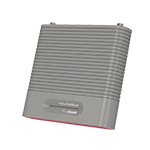WiFi vs Cellular Data: Which is More Secure?
Is Cellular Data More Secure than WiFi?
The internet can be accessed from anywhere: in your home, at your local coffee shop, and even on the train. It’s almost second nature to browse the web, shop online, and post on social media.
But, have you ever considered the security of the network you're connected to? Many prefer WiFi over cellular because it offers faster speeds. This is especially true in areas with weak cellular signals. In such situations, a cell phone signal booster can help.
Let’s take a look at which network is more secure, cellular or WiFi.
We fix poor cell phone signal! Find the right signal booster for you:




What’s the Difference Between WiFi and Cellular?
Both WiFi and cellular data allow you to connect your devices to the internet, but they differ in how they deliver that connection.
WiFi uses radio waves to create a short-range network that has an established connection, typically within your home or office. It provides a high-speed and stable connection, but you need to be within range of a router to access it.
Cellular data, on the other hand, provides internet access through your nearest cell tower. This allows you to stay connected almost anywhere, but the speeds can be slower and data usage often comes with charges depending on your plan.
How Do Cellular Devices Connect to the Internet?
There are three ways of accessing the internet:
1) Cellular Networks
5G, 4G, and LTE networks connect to the internet through a mobile network provider (AT&T, Verizon, T-Mobile, etc.) rather than an internet service provider. If you’re within your mobile carrier’s geographical coverage area, you can access the internet anywhere.
All mobile data is encrypted. More on this later.
2) Private WiFi Network
Private WiFi Networks are mainly found in homes and offices. Rather than cellular towers facilitating the data transfer, it’s done through an internet service provider.
Private WiFi connections use WEP, WPA, WPA2, or WPA3 to securely transfer information between devices. They’re WiFi security authentication protocols designed to encrypt wireless network data.
Networks using WEP have proved vulnerable to data breaches. Private WiFi routers using WPA/WPA2 are more secure. However, the security wall can be broken by determined cyber criminals within a few hours, sometimes minutes. WPA3 security is supposed to be much more secure and nearly impossible to hack. Though it’s not hacker-proof, it’s as close as is widely available.
3) Public WiFi Hotspot Networks
Public WiFi is widely available, such as coffee shops, airports, and shopping centers, but it’s the riskiest way to access the internet. Unlike secure home networks, public WiFi often lacks encryption, leaving your data exposed. This means anyone nearby could potentially steal your credit card numbers, passwords, or other sensitive information.
Tons of people access the internet through free networks, and anybody who knows what to do and where to look might be waiting nearby to attack.
Is Cellular Data Secure?
Accessing the internet via your cellular network is secure.
Data transferred through 5G, LTE, and 4G connections are encrypted. Your identity is authenticated and protected.
What Does “Encryption” Mean?
It’s a safety measure used to scramble or change a message to protect the information stored on all Internet of Things (IoT) devices. Mobile encryptions protect your text messages, pictures, videos, and data information.
Encryption methods come in the form of keys. Most phones have a secure chip that contains a private key within the phone’s hardware. The private key is made up of 256 bits in length. All data transmitted is coupled with a private key that can only be decoded by the recipient. If someone were to intercept your data, it could take a long time to run through all possible combinations.
There are also teams of people, known as white hat hackers, that are actively working on finding security holes in mobile networks. If holes are identified, they are reported to the appropriate telecommunication entities, such as the 3rd Generation Partnership Project (3GPP) and the GSM Association. The necessary measures can then be taken to further improve 5G, 4G, and LTE security.
Does this mean that cellular data can’t be hacked? Unfortunately, nothing connected to the internet is safe from attackers. There have been cases where cellular data has been breached, but it happens a lot less often than through WiFi networks.
Does this Mean Cellular Networks are More Secure than WiFi?
Transferring mobile data through a cellular network is much safer than using a public WiFi network. As mentioned, most of the time public hotspots aren’t protected. Private WiFi networks, on the other hand, can be just as secure as cellular networks. Though, in some cases, they’re still less reliable.
When Should I Use WiFi over Cellular, and Vice Versa?
For maximum security, cellular data is generally preferable to WiFi, especially on public networks. Public WiFi hotspots are often unencrypted, leaving your data vulnerable to snooping, and even rogue hotspots. The secure nature of 4G network encryption, and cellular networks makes it significantly more difficult for attackers to exploit.
However, convenience can come into play. WiFi, when connected to a secure private network, like at home, offers superior speed and doesn't usually count towards data limits. So if you're at home or using a trusted, password-protected WiFi network, it's always a secure and fast option. But when security is paramount, especially on public WiFi, prioritize cellular data for activities that involve sensitive information.
Why are WiFi Networks Not as Safe as Cellular?
Anybody with the right tools and knowledge can hack into a WiFi network. While this is also true for cellular, it's more common among WiFi. This is especially dangerous for businesses as they have a lot of company, employee, and client information in their systems.
Hackers can easily steal sensitive company data from any device connected to public networks. It could be from the company's free guest network or the coffee shop across the street. Since cybercriminals know the way to the juicy data is through their private network, they're susceptible to many attacks.
There are many ways WiFi networks can be hacked:
- Packet Sniffing: If data is being transferred through an unencrypted network, it can be intercepted using sniffer tools. This allows cybercriminals to analyze your data.
- Man in the Middle Attacks (MITM): MITM is like eavesdropping. The attacker positions themselves between the user and an application. They listen to the transferred data to capture sensitive information. Since most public networks are unencrypted, they can access browsing history, logins, texts, and more.
- Rouge Hotspots or Evil Twins: Evil Twins are disguised public WiFi hotspots. They usually have the same name or a similar name as a real hotspot network within the vicinity. If a person were to connect to the rogue hotspot, the hacker could intercept the data and insert malware into the device.
- Sidejacking or Session Hijacking: This is used to hijack data sessions. Cybercriminals will then pretend to be the authorized user and steal sensitive information.
How to Protect Your Data?
Truth be told, your data will never be 100% hack-proof. Fortunately, some steps can be taken to mitigate the threat.
- The first and most important: AVOID USING PUBLIC WIFI NETWORKS. At least, for anything where you care about your privacy. Yes, they are convenient and free, but at what cost?
- When accessing the internet, always use your cellular connection or private WiFi connection.
- If you happen to ignore the first rule, do not shop online or visit websites or apps that contain sensitive information.
- Use two-factor authentication when possible. This way, if a cybersecurity criminal breaks past your network's data security, your account details will be protected.
- Enable the firewall on your devices to protect against unauthorized activities.
- Invest in antivirus software. They identify malware and alert the user of suspicious activity.
- Make sure to keep your software and operating systems (Apple iOS, Android OS, Chrome OS, and Microsoft Windows OS) up-to-date. This can help protect your smartphones from viruses and malware. Older software and operating systems become outdated and are easier to hack.
If you often find yourself using public WiFi networks, we recommend investing in a mobile hotspot or a cell phone signal booster. The hotspot creates a secure portable WiFi network. The booster enhances your cellular reception so you can use your mobile data without issues.

Most popular signal booster that works for most people.
Buy Now at $569.99
Contact Us
Wilson Amplifiers is a leading provider of signal boosters. They take your existing weak cellular signal, amplify it, and broadcast it into your home, office, or vehicle. An existing internet connection is not needed for them to work. We also offer powerful cellular routers. They're designed to deliver an unbreakable secure WiFi connection.
Please call us at 1-800-568-2723 or email us at sales@wilsonamplifiers.com with any questions you have. Never again will you have to rely on unsafe public WiFi.
Interested in Learning More? Check Out Our Signal Boosting Info Center


Money Back Guarantee

Technical Support